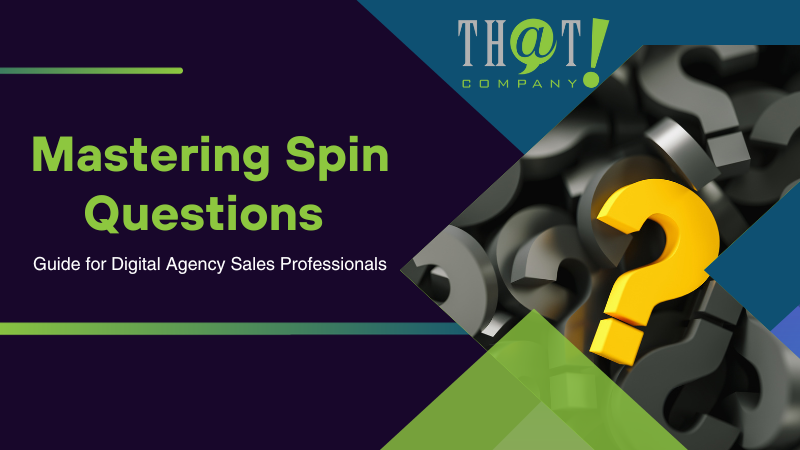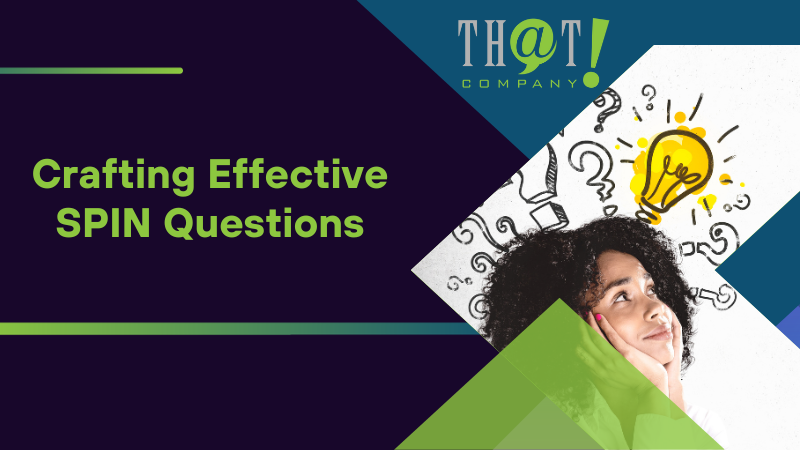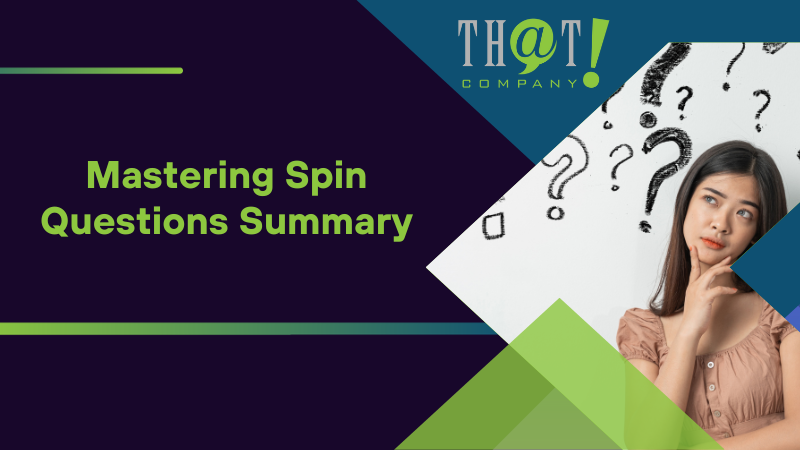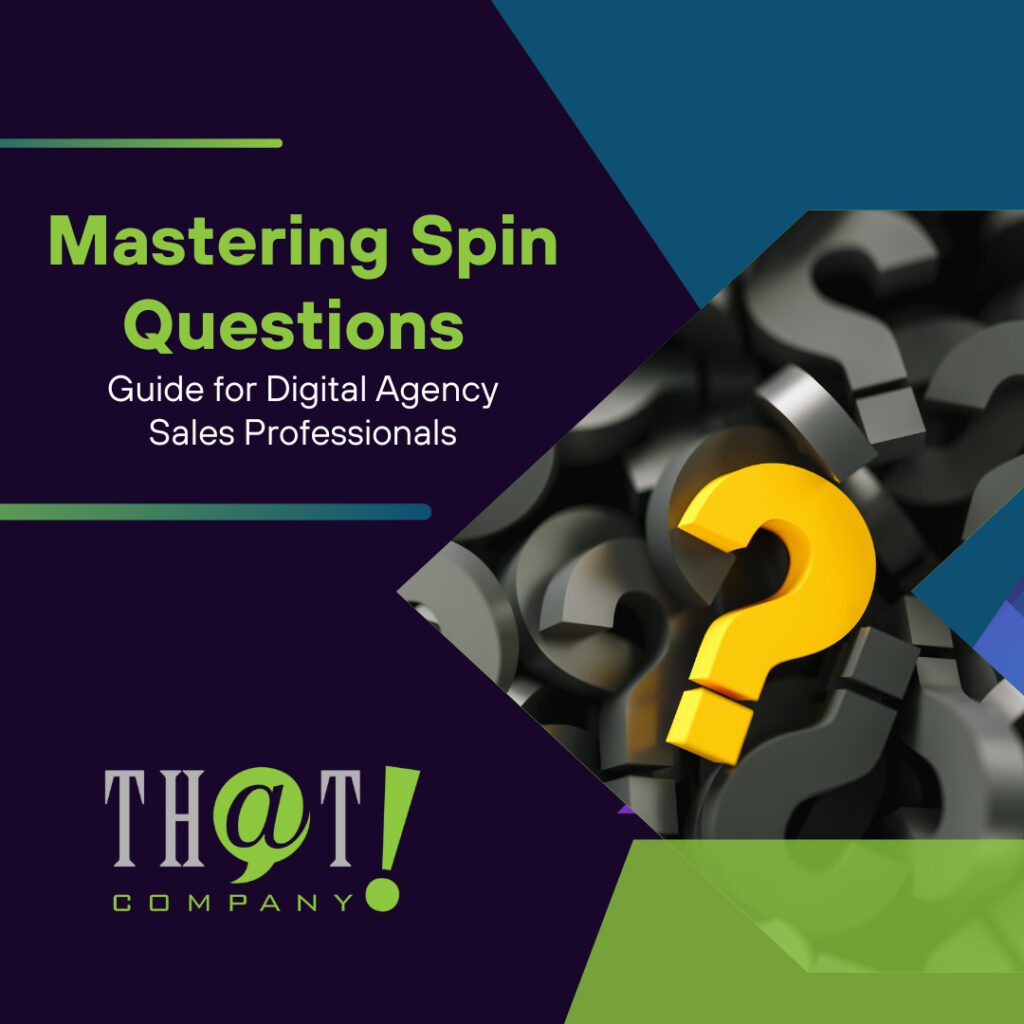
Master the art of closing deals and building lasting relationships with clients using SPIN selling, a proven sales methodology that has transformed the world of agency sales. In this blog post, we will explore the secrets behind SPIN selling, its origins, how to craft effective spin questions, and how to implement it in your sales strategy. Are you ready to revolutionize your sales process with spin questions?
Short Summary
-
SPIN Selling is a sales methodology that enables reps to build trustful relationships and uncover customer needs.
-
SPIN questions help guide prospects through the buying process, creating urgency and value recognition for solutions.
-
Leveraging technology, including cutting-edge white label software, training programs, resources, and CRM integration can equip your team with the necessary knowledge and tools to succeed in SPIN selling.

Why SPIN is important in Agency Sales
SPIN selling, with its focus on initiating relationships and asking the right questions, has proven to be a game-changer in the realm of agency sales. The significance of SPIN selling lies in its ability to:
-
Help sales reps identify and address intricate sales scenarios by inquiring the pertinent questions at the appropriate time
-
Enable sales professionals to achieve more successful sales
-
Develop enduring connections with customers
Understanding and incorporating the SPIN selling process into your digital marketing agency sales strategy can significantly boost your sales success. Some key benefits of using CRM software in the SPIN selling process include:
-
Enhancing the quality of sales relationships
-
Providing a streamlined approach to managing customer information
-
Tracking interactions to improve customer engagement and follow-up
By utilizing CRM software, you can effectively manage your sales process and increase your chances of closing deals.
By actively listening and demonstrating genuine interest in customers as individuals, sales professionals can establish customer relationships, which are crucial for successful sales interactions.

Understanding SPIN Selling: The Basics
SPIN selling, also known as spin sales, is a powerful sales methodology that focuses on asking specific spin selling questions to understand the buyer’s issues and requirements. By identifying customer pain points and providing tailored solutions, the spin selling method has proven to be highly effective in facilitating successful sales and lasting relationships with clients.
To truly master SPIN selling, it’s essential to delve into its origins and development, as well as to understand the key components that make it an effective sales tool. This knowledge will not only provide a solid foundation for implementing SPIN selling in your sales strategy, but also offer valuable insights into adapting it to different industries and customer types.
Origins and Development of SPIN Selling
SPIN selling was devised by Neil Rackham, who introduced it in his 1988 sales book after conducting a 12-year research project analyzing 35,000 sales calls. Rackham’s groundbreaking research dispelled numerous commonly accepted notions of what drove a sale, such as deploying open questions and outlining a product’s advantages to generate interest during a sales call.
Since its introduction, SPIN selling has gained widespread adoption across various industries thanks to its effectiveness in addressing complex sales scenarios and its focus on establishing genuine connections with clients. As a result, it has become an indispensable sales tool for countless sales professionals worldwide, enabling them to build long-term relationships and consistently close deals.
Key Components of SPIN Selling
The SPIN selling methodology consists of four types of questions:
-
Situation
-
Problem
-
Implication
-
Need-Payoff
These questions work together to help sales reps uncover customer needs and pain points, guiding prospects through the buying process and ultimately leading to a successful sale.
Rackham asserts that prospects find SPIN implication questions intellectually stimulating, enabling sales and support teams to create more comprehensive and valuable solutions for potential customers. By understanding the roles of each type of SPIN question and how they interact, sales professionals can effectively navigate sales conversations and address the unique challenges and needs of their clients.

Crafting Effective SPIN Questions
Mastering the art of crafting effective SPIN questions is crucial for any sales professional looking to excel in their field. By asking the right questions at the right time, sales reps can uncover valuable information about their prospects, identify pain points, and ultimately guide them to the most suitable solution.
To become proficient in asking SPIN questions, it’s essential to understand the purpose and structure of each type.
-
Situation questions
-
Problem questions
-
Implication questions
-
Need-payoff questions
By focusing on each type of question and learning how to craft them effectively, sales professionals can significantly enhance their ability to connect with clients and close deals.
Situation Questions
Situation questions are the starting point of the SPIN selling process, designed to collect pertinent information about a prospect’s current state and potential issues. These questions help sales reps gather valuable data about their prospects, allowing them to better understand their needs and tailor their sales pitch accordingly.
However, it’s important for a sales rep to avoid turning the conversation into a one-sided interrogation. Sales reps should strive to engage their prospects in a natural and genuine manner, ensuring that the conversation remains focused on the prospect and their own problems. By asking well-crafted situation questions, sales professionals can lay the foundation for a successful sales interaction.
Problem Questions
Problem questions are crucial in the SPIN selling process, as they help sales reps identify and address the pain points of their prospects, leading to more targeted solutions. By inquiring about areas of dissatisfaction and where the solution can offer value, sales professionals can better understand the challenges their clients face and how their product or service can help alleviate them.
To successfully craft problem questions, sales reps should dive deeper into the issues uncovered during the situation questions stage, focusing on any potential challenges and areas where improvement is desired. By pinpointing these areas, sales professionals can tailor their sales pitch to address the unique needs of their target audience.
Implication Questions
Implication questions play a vital role in the SPIN selling methodology, as they emphasize the potential repercussions of not dealing with a prospect’s issues, thus prompting a sense of urgency. By highlighting the extent and seriousness of a prospect’s problem, sales reps can demonstrate the need for immediate action and position their solution as the best choice to address the issue.
According to Rackham, implication questions can make a significant difference in sales success by creating a sense of urgency and helping prospects understand the productivity cost of not addressing their problems. By crafting powerful implication questions, sales professionals can effectively guide their prospects towards realizing the value of their solution.
Need-Payoff Questions
Need-payoff questions are the final stage of the SPIN selling process, guiding prospects to recognize the value of the sales rep’s solution and ultimately close the deal. These questions encourage prospects to arrive at their own conclusions about the benefits of the product or service being offered, making the decision to purchase feel more natural and less forced.
When crafting need-payoff questions, sales reps should build upon the implication and need payoff discussed in the previous stage, focusing on how their solution can alleviate the prospect’s pain points and deliver tangible benefits. By effectively employing need-payoff questions, sales professionals can successfully guide their prospects through the decision-making process and secure a commitment to purchase.

Implementing SPIN Selling in Your Sales Strategy
Incorporating SPIN selling into your sales strategy involves:
-
Aligning it with your existing sales process
-
Adapting it to suit various industries and customer types
-
Understanding the unique needs of your clients
-
Customizing your sales process accordingly
-
Equipping your sales team with the tools and knowledge necessary to succeed in today’s competitive market
Integrating SPIN selling into your digital marketing agency sales process offers several benefits.
-
Enhances overall sales performance
-
Enables your sales team to build long-lasting relationships with clients
-
Leads to repeat business and increased revenue
With the right training and resources, your sales team can master the SPIN selling methodology and transform the way they approach sales interactions.
Aligning SPIN with Your Digital Marketing Agency Sales Process
To effectively align the spin methodology, known as SPIN selling, with your agency’s sales process, it’s crucial to understand the key components of the methodology and how they can be integrated into your existing workflows. This includes identifying the stages of your sales cycle where SPIN questions can be most effectively utilized, as well as ensuring that your sales team has access to the necessary resources and training to master the technique.
By seamlessly integrating SPIN selling into your agency’s sales process, you can ensure that your sales team is better equipped to handle complex sales scenarios and build lasting relationships with clients. As a result, your sales team will be able to consistently close deals, driving revenue growth and fostering long-term customer loyalty.
Adapting SPIN Selling to Different Industries and Customer Types
To effectively adapt SPIN selling to different industries and customer types, it’s essential to understand the unique needs and challenges of each sector and tailor your sales approach accordingly. This can be achieved by researching industry-specific pain points and identifying the most relevant SPIN questions to address those issues.
In addition to understanding the unique needs of each industry, including the white label marketing agency sector, it’s crucial to customize your sales process and questions to cater to the specific preferences of different customer types. By doing so, you can ensure that your sales team is well-prepared to tackle diverse sales scenarios and efficiently adapt their approach to suit the needs of each individual prospect.

Leveraging Technology to Support SPIN Selling
Leveraging technology to support SPIN selling is essential for optimizing your sales team’s performance and ensuring they have access to the resources they need to succeed. From CRM integration to sales enablement tools, technology can play a pivotal role in enhancing the effectiveness of your agency’s SPIN selling efforts.
By integrating technology with SPIN selling, your sales team can streamline their workflows, access valuable customer data, and ultimately close more deals. As a result, your agency will be better positioned to thrive in today’s competitive market and deliver an exceptional customer experience every time.
CRM Integration
Integrating SPIN selling with your CRM system can significantly enhance your sales team’s ability to track customer information and manage sales interactions effectively. By consolidating all relevant customer data in a single platform, your sales reps can easily access the information they need to craft personalized and targeted SPIN questions, ensuring a more meaningful and impactful sales conversation.
Moreover, CRM integration can help streamline your sales process, enabling your sales team to identify potential opportunities and manage their sales pipeline more efficiently. With a well-integrated CRM system, your sales team will be better equipped to deliver exceptional customer experiences and drive lasting relationships with clients.
Sales Enablement Tools
Sales enablement tools play a crucial role in supporting SPIN selling, providing your sales team with the resources they need to excel in their sales efforts. From CRM integration to sales training programs and self-study options, these tools can help your sales team hone their SPIN selling skills and consistently close deals.
By investing in sales enablement tools that support SPIN selling, you can ensure that your sales team is well-equipped to navigate complex sales scenarios and build lasting relationships with clients. As a result, your agency will be better positioned to thrive in today’s competitive market and deliver an exceptional customer experience every time.

SPIN Selling Training and Resources
To help your sales team master the SPIN selling methodology, it’s essential to provide them with the appropriate training and resources. Formal sales training programs, such as those offered by Huthwaite International, can equip your team with comprehensive SPIN selling instruction, while self-study options like books and online resources allow your sales team to learn and practice at their own pace.
By investing in SPIN selling training and resources, you can ensure that your sales team has the knowledge and skills necessary to excel in their sales efforts. As a result, your agency will be better positioned to thrive in today’s competitive market and deliver an exceptional customer experience every time.
Formal Sales Training Programs
Formal sales training programs can provide your sales team with comprehensive instruction on the SPIN selling methodology. These structured programs are designed to equip your team with the necessary knowledge, skills, and techniques to succeed in sales. The programs encompass aspects such as:
-
Prospecting
-
Lead generation
-
Effective communication
-
Negotiation
-
Closing deals
By enrolling your sales managers in these programs, you can ensure that they are well-prepared and equipped to excel in their sales efforts.
By investing in formal sales training programs, you can ensure that your sales team is well-prepared to tackle diverse sales scenarios and efficiently adapt their approach to suit the needs of each individual prospect. As a result, your agency will be better positioned to thrive in today’s competitive market and deliver an exceptional customer experience every time.
Self-Study Options
For sales professionals who prefer to learn at their own pace, self-study options such as books and online resources are an excellent choice for mastering the SPIN selling methodology. Notable books on SPIN selling include Neil Rackham’s “SPIN Selling,” “The New Solution Selling” by Keith M. Eades, and “The Challenger Sale” by Matthew Dixon and Brent Adamson.
Online resources, such as SPIN Selling Online Training, SPIN Selling Certification, and SPIN Selling Masterclass, provide additional avenues for learning and practicing the methodology. By exploring self-study options, sales professionals can gain a deeper understanding of the SPIN selling process and apply their newfound knowledge to real-world sales interactions.

Summary
In conclusion, mastering the SPIN selling methodology can greatly enhance your sales team’s performance and help your agency establish lasting relationships with clients. By understanding the origins and key components of SPIN selling, crafting effective questions, implementing the methodology in your sales strategy, leveraging technology, and investing in training and resources, your sales team will be well-equipped to navigate complex sales scenarios and consistently close deals. It’s time to revolutionize your sales process and achieve unparalleled success, especially if you are a white label company looking to thrive in a competitive market

Frequently Asked Questions
What are the 4 SPIN questions?
The four SPIN questions are Situation, Problem, Implication, and Need-payoff, which guide customer conversations.
What is an example of a SPIN implication?
By connecting the value of solving a problem with the capabilities of your product, SPIN implications suggest that your product is the best solution and the customer is more likely to accept it.
This technique can be used to create a persuasive argument that resonates with the customer and encourages them to purchase your product.
What is the most powerful of all SPIN questions?
Implication questions are the most powerful SPIN questions, and are also the hardest to ask. They are used extensively by top salespeople.
What is the acronym SPIN in sales?
SPIN stands for Situation, Problem, Implication, and Need-Payoff – four categories of questions that sales professionals use to guide conversations with prospects. This technique helps reps understand the prospect’s current state and increase their closing rate.
By using SPIN, sales reps can ask the right questions to uncover the prospect’s needs and challenges. This helps them to tailor their pitch to the individual and increase their chances of closing the deal.
SPIN is an effective tool.
What are SPIN questions examples?
SPIN Selling questions are a popular technique used to identify customer needs and target potential solutions. They involve situational, problem, implications, and need-payoff types of questions.



























 Talk With Us
Talk With Us  Give Some Love
Give Some Love 


